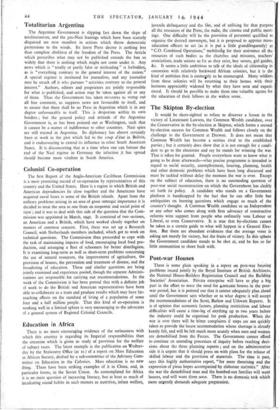The Skipton By-election It would be short-sighted to refuse to
discover a lesson in the victory of Lieutenant Lawson, the Common Wealth candidate, over the Conservative in the by-election at Skipton, which forms a second by-election success for Common Wealth and follows closely on the challenge to the Government at Darwen. It does not mean that
Common Wealth has become a serious rival to the established parties ; but it certainly does show that it is not enough for a candi- date to go to the electorate and say he stands for winning the war. That is taken for granted. People everywhere want to know what is going to be done afterwards—what precise programme is intended in regard to social security, unemployment, housing, planning, health and other domestic problems which have been long discussed and must be tackled without delay the moment the war is over. Except on the subject of education, there is no outstanding question of post-war social reconstruction on which the Government has deirl3i set forth its policy. A candidate who stands on a Government platform is handicapped by the fact that he can offer little but ambiguities on burning questions which engage so much of the country's thought. A Common Wealth candidate or an Independent or any other who comes along with firm advocacy of constructive reforms wins support from people who ordinarily vote Labour or Liberal, or even Conservative. It is true that by-elections cannot be taken as a certain guide to what will happen in a General Elec- tion. But there are abundant evidences that the average voter is asking not merely for victory, but the fruitsnf victory. In this sphere the Government candidate stands to be shot at, and he has so far little ammunition to shoot back with.


























 Previous page
Previous page